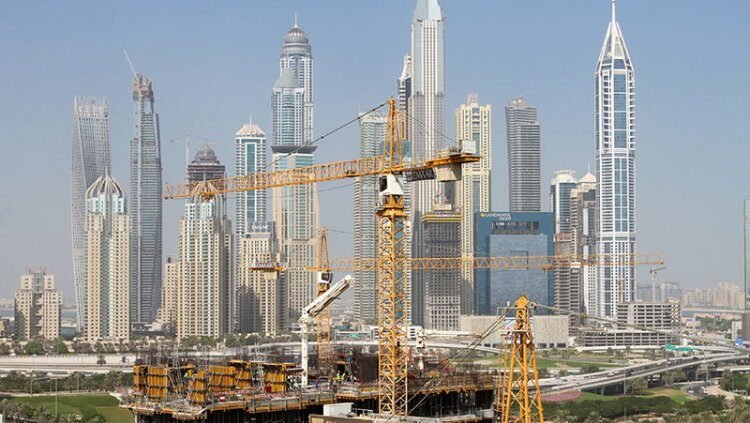The United Arab Emirates (UAE) is gearing up for a major construction boom, with the market expected to grow at a steady rate of 3.8% annually from 2025 to 2028. This growth is being fueled by increased investments in real estate, infrastructure projects, and sustainable developments across the country. The UAE has been a global leader in construction, with its skyline dominated by futuristic skyscrapers, world-class hotels, and innovative smart cities. Now, the country is setting the stage for even greater expansion, driven by government initiatives and private sector investments.
Why Is UAE’s Construction Market Growing?

There are several reasons behind this consistent growth in the construction industry:
- Government Investments in Mega Projects
The UAE government is heavily investing in infrastructure, including smart cities, transport networks, and energy projects. Dubai’s Expo 2020 legacy developments and Abu Dhabi’s Vision 2030 are key drivers of this growth. The leadership is focused on making the country a global hub for business, tourism, and innovation. Large-scale projects such as new metro lines, high-speed rail networks, and mixed-use developments are transforming urban landscapes. - Surging Demand for Real Estate
With a rising population and an influx of foreign investors, the demand for residential and commercial properties is increasing. High-end real estate projects in Dubai, Abu Dhabi, and Sharjah are attracting both local and international buyers. Additionally, new government policies that allow foreign ownership of properties in certain areas are encouraging more expatriates to invest in the real estate market. Luxury villas, high-rise apartments, and waterfront properties are among the most sought-after developments. - Focus on Sustainable and Smart Construction
Green buildings, eco-friendly materials, and smart city projects are becoming a priority. The UAE is promoting sustainable construction practices in line with its Net Zero 2050 goals. Developers are integrating smart home technologies, solar power, and water conservation measures to reduce the environmental impact of new buildings. The demand for LEED-certified buildings is increasing, and companies that adopt green construction methods are gaining a competitive edge in the market. - Tourism and Hospitality Expansion
The UAE’s tourism sector is growing rapidly, leading to new hotels, resorts, and entertainment facilities. The country aims to attract 40 million visitors annually by 2031, further driving construction demand. The hospitality industry is continuously evolving to meet the needs of international travelers, with new theme parks, shopping malls, and luxury resorts being developed. High-profile projects such as the expansion of Yas Island and the construction of unique attractions in Dubai are expected to boost tourism-related construction activity.
Key Projects Fueling Growth
Some of the most anticipated construction projects contributing to this boom include:

- Dubai Urban Tech District – A massive innovation hub focusing on technology and sustainability. This project is set to create thousands of jobs and attract tech entrepreneurs from around the world.
- Etihad Rail – A national railway project connecting major cities and industrial hubs. The rail network will enhance connectivity between different emirates and improve logistics and transportation efficiency.
- NEOM-style Futuristic Developments – Several mega-projects inspired by Saudi Arabia’s NEOM are in the pipeline. These developments will incorporate advanced technology, AI-driven urban planning, and futuristic architecture.
- Expansion of Airports and Seaports – Dubai and Abu Dhabi airports are undergoing significant upgrades to accommodate more travelers. The UAE is also investing in seaports to strengthen its position as a global trade and logistics hub.
- New Residential Communities – Large-scale housing projects, including gated communities, waterfront developments, and affordable housing initiatives, are being introduced to cater to the growing population.
Challenges in the UAE Construction Industry
Despite the promising growth, the construction industry faces a few challenges:
- Rising Material Costs – Inflation and global supply chain disruptions have led to increased prices for raw materials. Construction companies are seeking alternative materials and suppliers to manage costs effectively.
- Labor Shortages – The demand for skilled workers is growing, and companies are struggling to find qualified labor. Efforts are being made to attract and train construction professionals to meet the industry’s needs.
- Strict Sustainability Regulations – While eco-friendly construction is beneficial, meeting strict regulations can be costly and time-consuming. Developers must adhere to stringent environmental guidelines and invest in advanced technologies to comply with government policies.
- Project Delays and Budget Constraints – Some projects experience delays due to financial constraints, regulatory approvals, and logistical challenges. Effective planning and risk management strategies are essential to ensure smooth project execution.
Opportunities for Businesses and Investors
The steady growth of the UAE’s construction market presents numerous opportunities for businesses and investors:
- Real Estate Investment – Developers can capitalize on the rising demand for residential and commercial properties. Investors can explore off-plan property purchases, rental yields, and long-term capital appreciation.
- Infrastructure Development – Companies specializing in roads, bridges, and railways can benefit from government contracts. Public-private partnerships (PPPs) are being encouraged to facilitate large-scale infrastructure projects.
- Sustainable Solutions – Businesses focusing on renewable energy, smart buildings, and green materials will have a competitive edge. The push for sustainability is creating new business opportunities in the construction sector.
- Technology Integration in Construction – The adoption of digital technologies, AI, and automation is reshaping the construction industry. Companies that embrace innovation, such as 3D printing, modular construction, and Building Information Modeling (BIM), can gain a significant advantage.
Conclusion
The UAE’s construction market is on an upward trajectory, with a projected 3.8% annual growth from 2025 to 2028. Fueled by government initiatives, real estate demand, and sustainability efforts, the industry is poised for significant expansion. While challenges exist, opportunities for businesses and investors remain vast, making it an exciting time for the UAE’s construction sector. With ambitious plans for infrastructure, smart cities, and eco-friendly projects, the UAE is solidifying its reputation as a global leader in modern construction and urban development. The next few years will be crucial in shaping the future of the nation’s built environment, attracting international investors, and setting new benchmarks for architectural excellence.
Also read: UAE’s Technology Boom: Government Support and Foreign Investments Driving Growth













